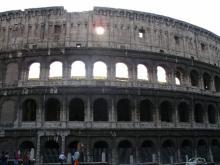Rome, Italy
Sponsored by The Comparative History of Ideas and the Department of English
The Comparative History of Ideas Program at the University of Washington will offer a ten week, concentrated study abroad program this spring that will allow students to explore the rich historical and cultural legacy of the city of Rome.
This program is designed for both students and community members. Participants will receive 12 credits.
The spring Rome program is intended to offer the first-time visitor to Rome a study opportunity that combines tours of its prominent historical sites together with a focused inquiry into its multiple layers of historical significance.
Please note: The UW Rome Center is a great resource for information with answers to many of your questions about studying and living in Rome.
All students are required to have cellular phones while enrolled.
CHID 442/ EURO 490 - Roma Eterna, Structures of Meaning (5 credits)
Professor Doug Merrell
Rome, established in 753 B.C., is one of the oldest continuously inhabited urban environments in the world. It has survived through various transformations for almost 3,000 years. Besides being a popular tourist destination because of its many celebrated attractions such as the Colosseum, it constitutes a complex living museum of human cultural enterprise in which several layers of historical development can be explored in one site. As a result, Rome provides a unique setting for examining the various ways in which human communities create a sense of meaning and order through their ongoing reappropriation of the past. The focus of this course will be on a comparative analysis of the way in which Rome has been modified over time to reflect different conceptions of human identity and community. An inquiry into the cultural legacy of Rome will begin with its ancient and imperial foundations. The course will then consider later historical periods of Rome such as the Medieval, Renaissance, the Baroque, Fascist and Contemporary Rome. An analysis of Rome's legacy as the eternal city will be pursued through selected readings linked to specific site visits in and around the historical center of the city.
CHID 471A/ENGL 490 - Contracts of the Heart: Gift and Sacrifice (5 credits)
Professor Raimonda Modiano
This seminar will introduce students to concepts of gift and sacrifice, two foundational structures of exchange that have ruled economic, social and religious life since the inception of culture. Both raise fundamental questions about the constitution of communities by means of the binding power of gratitude, or, more ominously, sacrificial scapegoats. As a contemporary critic wrote (Mark Osteen), the study of the gift touches on some of the most fundamental concerns that define our humanity: “freedom and autonomy, calculation and spontaneity, gratitude and generosity, risk and power.” The study of sacrifice in turn generates a series of provocative as well as unsettling questions: whether conceptions of the sacred are inextricably linked with violence, whether sacrificial rituals escalate rather than contain violence, whether recuperative economies that seek gain out of loss inevitably fuel sacrificial behavior, whether capital punishment is not in effect a contemporary version of ancient sacrificial rites, and whether communities can ever escape the predicament of uniting against a designated scapegoat and resorting to sacrificial ideologies. These and related questions will form the subject of this course which will introduce students to foundational texts in anthropology, psychoanalysis and sociology (Marcel Mauss, The Gift, Sigmund Freud, Totem and Taboo, Rene Girard, Violence and the Sacred) and to the representation of gift and sacrifice in the Bible, folklore, film (The Merchant of Venice, Babette’s Feast, Breaking the Waves,) and literature (Aeschylus, Agamemnon, William Shakespeare, The Merchant of Venice and Julius Caesar;“ Shirley Jackson, “The Lottery;” selected poems by Samuel Taylor Coleridge, William Wordsworth and Lord Byron). The course will also deal with specifically Roman customs of gift and sacrifice and use the rich resources in Rome, Venice and other cities to document the various representations, especially in Medieval and Renaissance Italian art, of three founding biblical stories of sacrifice: the sacrifice/murder of Abel by Cain, the sacrifice of Isaac by Abraham, and the sacrifice of Christ.
CHID 471B - General orientation to Rome or Independent Study (2-3 credits)
Students choose to do independent study on culture and/or history, they may consult with the instructors to determine a specific focus of interest to explore through concentrated study linked to options such as: self-guided tours, interviews, sketches, analytical reflections, etc.
The Rome program fee will cover instruction costs, housing, and transportation for required field trips. A $350 deposit, included in the program fee, will be assessed to the student’s tuition account just after the student signs the payment contract. In addition, the Office of International Programs and Exchanges will assess a $250 IPE fee at the same time. The IPE fee will remain on your account, but will not be due until the program starts.
The program fee does not cover: IPE fee, airfare, meals, insurance or personal travel and expenses.
Make sure to read our Fees, Financing, and Withdrawal page for information on paying for your trip.
